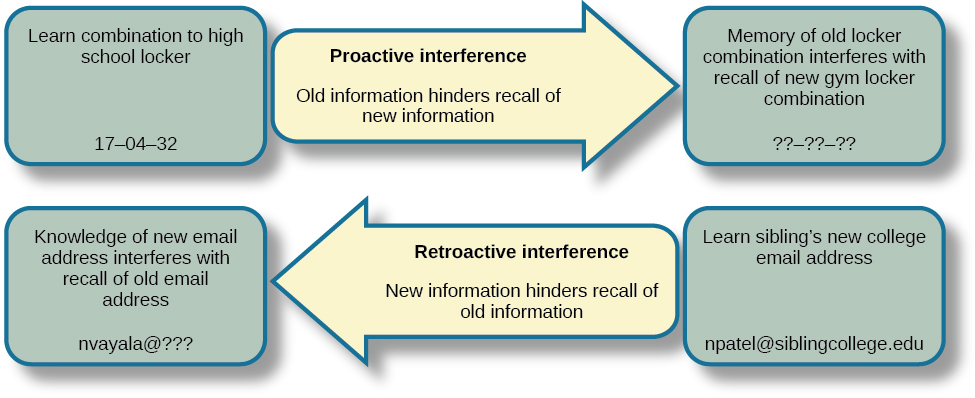Have you ever previously learned something in school that interfered with a lesson you are learning currently or learned something new that made you forget what you learned before? This is called proactive interference in psychology, and I have personally experienced this through exceptions to the rules in chemistry and math.

Proactive interference is the form of interference where old memories restrain the capacity to remember new information. Proactive interference occurs when past memories hold back an individual from retaining new memories. Proactive interference is very common when learning something in school. Many times when taking a test a person will remember something they learned in a previous lesson, but they cannot simply remember the new material they learned in that specific lesson. This is an example of proactive interference. Another example would be if an individual is trying to learn a new language like spanish, and they speak french already; the french language that is already known might interfere with the comprehension of spanish because they can be similar. The competition between the two memories prevents the new material from encoding into the individual’s memory. Proactive interference causes past memories to block the encoding of new memories typically because the memories might correlate or be similar in some way.
Retroactive interference is the form of interference where new memories restrain the capacity to old information; thus, the new material being added into an individual’s memory will make the individual forget some of the old memories. Even though there is competition between the two memories and the new material will win, there is no unlearning involved in retroactive interference. Something that affects retroactive interference is sleep or rest. If a person learns something new than rests or sleeps afterwards there is less of a chance that any new information will be retained; therefore, minimizing the possibility of retroactive interference to happen. An example would be if a dancer learned a series of steps or moves, and then only can remember the last move that was taught. Because the dancer forgot the previously learned information and could only remember the most recent information taught, the dancer experienced retroactive interference. Another example would be if someone speaks spanish, but then moves to France. Then they end up spending so much time learning and speaking french they forget how to correctly speak spanish. The newly learned information trumps the previous memories causing retroactive interference to occur.

In highschool I took Honors Chemistry and AP Chemistry, so coming to college I had a pretty decent background in chemistry. During my Chemistry 110B class we learned about how there are exceptions to the octet rule in Lewis Structures. While studying for my recent exam I could not remember to apply the exceptions to the octet rule because the old information was blocking the encoding of the new material. This is a representation of proactive interference because the old memories interfered with the comprehension of the new information.
My schedule this year has my Chemistry 110B class right after my Math 140B class every Monday, Wednesday, and Friday. After both of my classes are done I try to review what I learned in both lessons that day. I was always confused at how I was able to forget what I learned in my math class in such a short amount of time; however, I realized that this is an example of retroactive interference. The new information I learned in chemistry interfered with my memory of the lesson I learned in math causing me to forget the math lesson because chemistry and math can overlap making retroactive interference stronger.
Works Cited
Mcleod, Saul. “Proactive and Retroactive Interference.” Proactive and Retroactive Interference | Simply Psychology, 1 Jan. 1970, www.simplypsychology.org/proactive-and-retroactive-interference.html.
Shrestha, Praveen. “Proactive Interference.” Psychestudy, 16 June 2019, www.psychestudy.com/cognitive/memory/proactive-interference.
Shrestha, Praveen. “Proactive and Retroactive Interference.” Psychestudy, 16 June 2019, www.psychestudy.com/cognitive/memory/proactive-retroactive-interference.